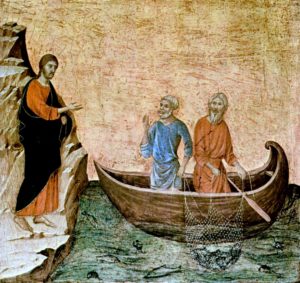Thoughts on Sunday’s Lessons for Jan. 26, 2020
First Reading: Isaiah 9:1-4
“The people who walked in darkness have seen a great light.”

Christ Calling the Apostles Peter and Andrew (1308-1311), panel from the Maesta Altarpiece of Sien, by Duccio di Buoninsegna (c.1255-1260 – c.1318-1319). National Gallery, Washington. National Gallery of Art. (Click image to enlarge.)
As we live through the darkest time of year, the short days of winter, we can feel the joy that gracious light brings in the darkness, a joy that the Prophet Isaiah and the Evangelist Matthew share in Sunday’s readings. Isaiah recalls the hard time when Israel’s Northern Kingdom, the lands of Zebulon and Naphtali that Jesus will later know as Galilee, have fallen to the Assyrian Empire, and the nation’s fate is in doubt. Isaiah prophecies that the future holds no gloom for those who are in anguish now: God will bring the people back to a world of bounty and joy.
Psalm: Psalm 27:1, 5-13
In words that mirror both the ideas and the emotions of the Isaiah reading, the Psalmist shouts with triumphant confidence that God is indeed our light, so there is nothing to fear. This is not just a happy-clappy praise song, though: There’s no denying that bad things can happen even to God’s own people. Enemies may surround them. But knowing that God is our light, our stronghold, and our salvation, we need not fear. We call on God to hear us, love us, protect us and keep us safe.
Second Reading: 1 Corinthians 1:10-18
After Paul’s assurance last week that the people of the church in Corinth had already received gifts that made them strong in faith, we now see that this small, troubled community was breaking into factions and quarreling. Remember to stand steadfast in faith, Paul reminds them, even when their Gentile neighbors consider them foolish for worshiping a crucified criminal. Baptism brings all together in unity in Christ. The cross represents the power of God to us as we are saved by it.
Gospel: Matthew 4:12-23
Quoting the Greek translation of the Isaiah passage we heard in the first reading, Matthew uses it to recognize Jesus as the fulfillment of Messianic prophecy. Then we look on as Jesus, grieving the murder of his cousin John and likely fearing for his own life, leaves his home in Nazareth to go to Capernaum, a larger city on the shore in Galilee, the ancient region of Zebulon and Naphtali, of which we heard Isaiah speak. There Jesus begins his public life, preaching in the same words as John so often used: “‘Repent, for the kingdom of heaven has come near.” Jesus then calls four fishermen – Peter, Andrew, and James and John, the sons of Zebedee. All four eagerly drop their nets and follow as Jesus preaches, teaches, cures and heals.
